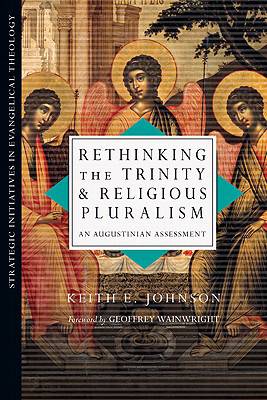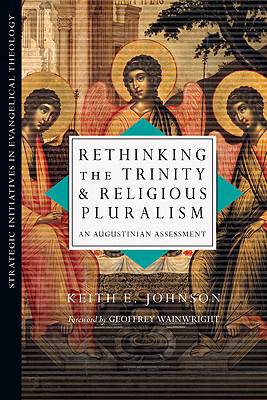
Door een staking bij bpost kan je online bestelling op dit moment iets langer onderweg zijn dan voorzien. Dringend iets nodig? Onze winkels ontvangen jou met open armen!
- Afhalen na 1 uur in een winkel met voorraad
- Gratis thuislevering in België vanaf € 30
- Ruim aanbod met 7 miljoen producten
Door een staking bij bpost kan je online bestelling op dit moment iets langer onderweg zijn dan voorzien. Dringend iets nodig? Onze winkels ontvangen jou met open armen!
- Afhalen na 1 uur in een winkel met voorraad
- Gratis thuislevering in België vanaf € 30
- Ruim aanbod met 7 miljoen producten
Zoeken
€ 48,95
+ 97 punten
Omschrijving
Increased interest in the doctrine of the Trinity has led to its use in formulating new, pluralistic approaches to the theology of religions. But theologian Keith Johnson is convinced that many of these forays are not salutary for Christian faith.Here Johnson critically engages the diverse proposals of Mark Heim, Amos Yong, Jacques Dupuis and Raimundo Panikkar. Johnson grounds his evaluation in an extended study of St. Augustine's trinitarian theology. Not only has this doctor of the church provided an ecumenical theological standard down through the ages, but, Johnson argues, one that should continue to serve as a criterion for faithful trinitarian thinking now. Locating the points at which the four proposals diverge from the Augustinian norm, Johnson delves into essential aspects of the trinitarian doctrine including immanence and economy, the relations of the divine Persons, and the proper use of the vestigia trinitatis in creation. Johnson's critique of these intriguing experiments draws attention to the methodological errors that plague attempts to apply the doctrine of the Trinity to a wide range of topics.
Specificaties
Betrokkenen
- Auteur(s):
- Uitgeverij:
Inhoud
- Aantal bladzijden:
- 286
- Taal:
- Engels
- Reeks:
Eigenschappen
- Productcode (EAN):
- 9780830839025
- Verschijningsdatum:
- 2/09/2011
- Uitvoering:
- Paperback
- Formaat:
- Trade paperback (VS)
- Afmetingen:
- 152 mm x 226 mm
- Gewicht:
- 430 g

Alleen bij Standaard Boekhandel
+ 97 punten op je klantenkaart van Standaard Boekhandel
Beoordelingen
We publiceren alleen reviews die voldoen aan de voorwaarden voor reviews. Bekijk onze voorwaarden voor reviews.











